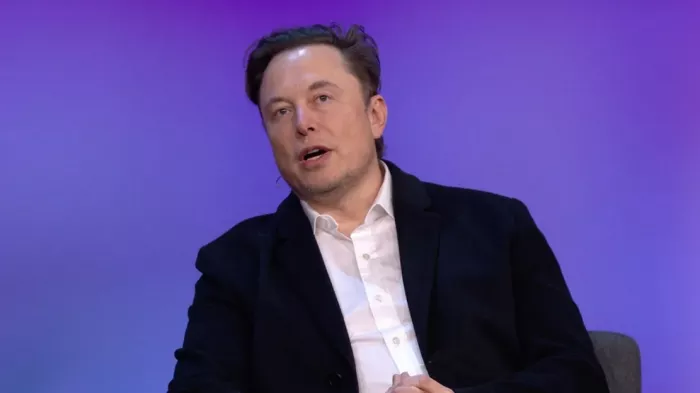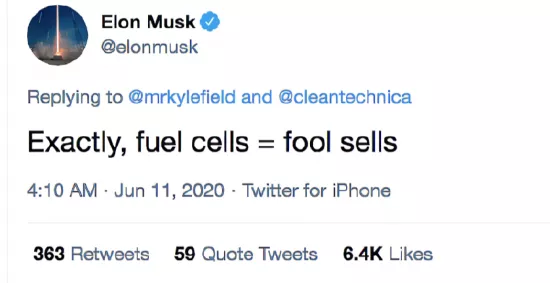Elon Musk, chief executive of Tesla, reiterated his doubts about the role of hydrogen in plans for a more sustainable future, calling it "the stupidest thing I can think of in energy storage."**

Original title: This is the stupidest thing! Musk reiterated that his doubts about hydrogen came from the new energy network
In an interview at the financial times future of the car summit, musk was asked whether he thought hydrogen could play a role in accelerating the escape from fossil fuels.
"No, I really can't emphasize that anymore. I've been asked about hydrogen more than 100 times, maybe even 200 times," Musk said
"It's important to understand that if you want a way to store energy, hydrogen is a bad choice," he said
Musk further elaborated on his view, adding that "huge containers" were needed to store liquid hydrogen. "Bigger" containers are needed if they are to be stored in gaseous form, he said.
The International Energy Agency describes hydrogen as a "multifunctional energy carrier". Hydrogen has a wide range of applications and can be used in industries, transportation and other sectors.
In 2019, the International Energy Agency said that hydrogen was "one of the main options for storing renewable energy, and it seems likely to be a low-cost option for storing electricity for days, weeks or even months."
The Paris based group added that both hydrogen and hydrogen based fuels can "transfer renewable energy over long distances - from areas rich in solar and wind energy, such as Australia or Latin America, to energy deficient cities thousands of kilometers away."
Musk has been strongly opposed to hydrogen and hydrogen fuel cells.
A few years ago, when reporters discussed this topic at the Automotive News World Conference, the electric vehicle giant called hydrogen fuel cells "extremely stupid".
In June 2020, he was on twitter "Fuel cells = stupid sales," it wrote, adding in July of the same year: "stupid sales of hydrogen cells are meaningless."

Judging from his comments this week, he still doesn't believe in hydrogen.
"It doesn't happen naturally on earth, so you either have to use electrolysis to split water or you have to crack hydrocarbons," he told the financial times
"When you crack hydrocarbons, you don't really solve the problem of fossil fuels, and the efficiency of electrolysis is very low."
Today, most hydrogen production is based on fossil fuels. Another production method includes electrolysis, which uses an electric current to decompose water into oxygen and hydrogen.
If the electricity used in this process comes from renewable energy sources, such as wind or solar energy, some people call it green or renewable hydrogen.
In recent years, the electrolytic hydrogen project has attracted the interest of large companies and business leaders, but musk doesn't seem to like it.
"The efficiency of electrolysis... Is poor," he told the financial times. "So breaking down hydrogen and oxygen requires a lot of energy. Then you have to separate hydrogen and oxygen and pressurize them - it also requires a lot of energy."
"If you have liquefied hydrogen, oh, my God!" He continued. "The energy needed to make hydrogen and turn it into a liquid is amazing. It's the stupidest thing I can think of about energy storage."
Musk may disapprove of the role of hydrogen in energy transformation, but some other influential voices are more optimistic. These include Anna shpitsberg, Deputy Assistant Secretary of state for energy transformation.
In a recent panel discussion chaired by Hadley gamble of CNBC, shpitsberg said that hydrogen is "a game changing technology that can talk to a variety of other sources... Because it can support nuclear energy, it can support natural gas, it can support renewable energy, it can be a good part of clean energy, and so can CCUs [carbon capture, utilization and storage ]."
In addition, Goldman Sachs Michele dellavigna, head of commodities equities at Goldman Sachs in Europe, the Middle East and Africa, stressed in February the important role he believed the industry would play in the future.
"If we want to achieve net zero emissions, we can't do it with renewable energy alone," he said
"We need something like natural gas, especially in controlling seasonality and intermittency, and that's hydrogen," della Vigna said He also described hydrogen as "a very powerful molecule".
"The key is to 'produce without emitting carbon dioxide'. That's why we talk about green hydrogen and blue hydrogen," he said
Blue hydrogen refers to hydrogen produced using natural gas, a fossil fuel, and carbon dioxide produced during capture and storage. There has been a heated debate about the role of blue hydrogen in the process of social decarbonization.
"Whether it's electrolysis or carbon capture, we need to produce hydrogen in a clean way," della Vigna said.
"Once we have it, I think we have a solution. One day, it may account for at least 15% of the global energy market, which means that there will be a market of more than $1 trillion a year."